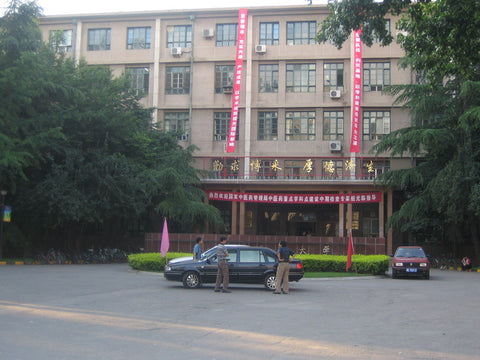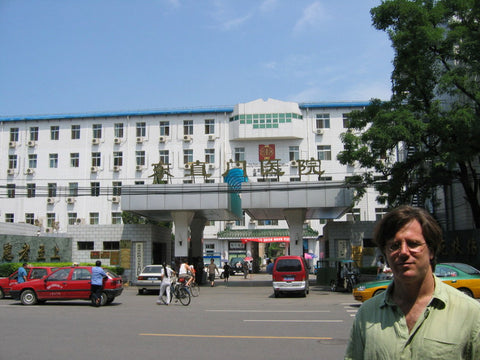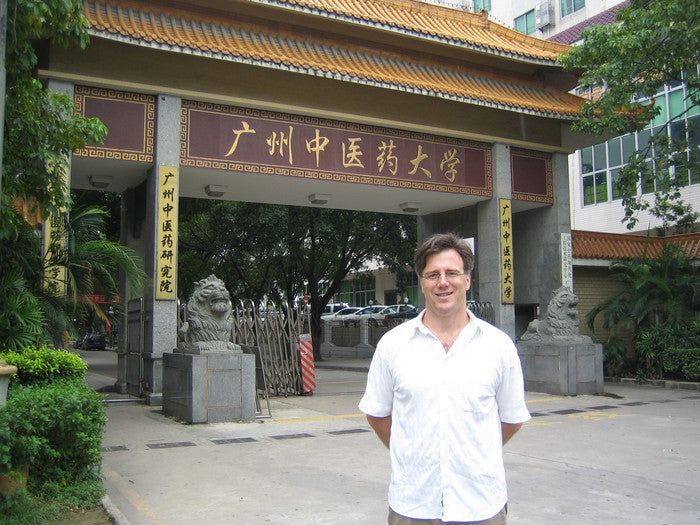“I had just graduated pre-med from Princeton, and all I really knew is that I didn’t want to be a doctor,” Dr. Eric Karchmer says with a laugh. “To my own embarrassment, I really had no idea what I was doing. I just wanted something different, honestly. I knew I didn’t want to be a paralegal in New York, like most of my friends.”
Today, Dr. Karchmer is a professor of Anthropology at Appalachian State in Boone, North Carolina, in addition to maintaining a Chinese medicine private practice for the last 15 years. He is founding member of DAO Labs, designing the formulas we use for our tonics, based on the two thousand year old practice of Chinese medicine and the needs of modern consumers.
"Traditional Chinese Medicine is tremendously diverse and complex. It's both food and medicine, simultaneously regimen for health maintenance and medicine for the seriously ill. I feel fortunate to have seen how it is used in China, where it is used so widely and in so many different ways."
A Boston Native from a Family of Doctors
Karchmer is a Boston native who grew up in a medical family. His father, uncle, and sister are all doctors, and his path seemed much the same before he found himself traveling to the city of Wuhan in China to teach English. Wuhan in 1987 was a far cry from present day China. “It was such a different place and seemingly so remote. It felt very third world to a kid from the American suburbs. There were no private cars, no telephones - in my first year I was only able to call home twice!”
Beyond the practical difficulties, Karchmer admits the first year was lonely. His command of Mandarin was basic, and there were few English speakers, Chinese or expatriates, to befriend. “I was teaching at the Wuhan Institute for Physical Education, and Qi Gong was very popular then - it was a craze. I remember watching the teacher and student Qi Gong practitioners at the institute, and just being so intrigued. I really wanted to know more about what they were doing,” said Karchmer.
In his second year, Dr. Eric moved to Taiwan, which he says was “a much more open society at the time. It was a very easy and enjoyable place to be.” There he devoted himself to learning Chinese. A friend introduced him to a Taoist priest who lived on the south end of the island. “I would go down there and visit with him from time to time. He was always extremely welcoming, and I was fascinated by his small temple. He was a healer of sorts. Sometimes he used herbs and temple offerings to solve people’s problems, sometimes he did ghost exorcisms. Mediation was very important to everything he did.”
“I was there for three years altogether, in the beginning. A year in Wuhan and two in Taiwan. I loved learning Chinese, I fell in love with the culture, and I found the history so fascinating. I decided to go back to grad school to study anthropology, even though I had never taken a class in it before!”
From Chapel Hill to Beijing
At UNC-Chapel Hill, Karchmer recalled the Qi Gong practitioner’s breathing exercises and decided to make it the focal point of his research. Returning to China in the mid 90s, he encountered Chinese medicine head on. “My Qi Gong studies didn’t seem to be going anywhere, and out of a bit of desperation I decided to take some classes at the Beijing University of Chinese Medicine, thinking maybe I could understand Qi Gong better if I understood the basics of Chinese medicine. But as soon as I started taking the classes, I realized that’s what I wanted to do. I was captivated by the beauty and richness of this medical system.”

Beijing University of Chinese Medicine, circa 2005, where Dr. Karchmer spent four years studying Chinese Medicine
In China, there are independent hospitals of Chinese medicine and Western medicine. Within these hospitals, there can be a lot of mixing of the two medical systems. “Doctors of Chinese medicine are well aware that they are competing with the Western medicine profession. As a result, there must also treat the full range of illnesses that one might find at a typical hospital of Western medicine.” Karchmer is grateful for the training that he received in China, particularly during his hospital rotations.
“There are so many incredible clinical challenges that are routinely treated with "TCM" every day, from strokes, cancer, skin problems, gynecological problems, coronary heart disease. It’s just part of normal hospital work to look for solutions within Chinese medicine.”
In the US, Karchmer agrees it’s difficult to challenge a skeptic’s point of view, but he believes that so much of the distrust is misplaced. Most Americans know so little about Chinese medicine, they can’t imagine all the ways it can be used. “When someone asks me, ‘Does Chinese medicine work?’ I say, ‘Does Western medicine work?’ The truth is there are invaluable therapies in both medical systems. But no doctor, no medical system has all the answers. In the West, we’ve resorted to taking drugs to manage our problems, not cure them. But there may be real solutions for these problems in Chinese medicine.”
"Show Me The Numbers!"
Doctors often want to “see the numbers,” be given concrete evidence that Chinese medicine works. “But doctors of Chinese medicine design their treatments in very different ways than doctors of Western medicine. They don’t rely on clinical trials to tell them which drugs work best for which diseases. Instead they try to evaluate the underlying cause, sometimes called the ‘pattern of disharmony,’ that leads to the patient’s presentation.” This means that there might be multiples ways of treating what might be considered one disease in Western medicine.

The acclaimed Dongzhimen Hospital in Beijing with a much younger Dr. Karchmer, circa 2006. Dr. Karchmer conducted a two-year residency at Dongzhimen.
According to Karchmer, it is essential for a doctor to correctly assess the patient’s “pattern of disharmony” to get good clinical results in Chinese medicine. But the “pattern of disharmony” is determined by the doctor’s interpretive skills rather than through the diagnostic procedures of biomedicine. “There have been more and more scientific, research-based studies of Chinese medicine, that have shown that acupuncture and herbal medicine carry real results. But these trials rarely guide clinical practice, as they might in Western medicine. Rather they are designed to convince the skeptics outside the profession of Chinese medicine.”
Dr. Karchmer mentioned the work of Dr. Tu Youyou and her colleagues as example of the recent scientific verification of Chinese herbal medicine. In 2015, Dr. Tu of the China Academy of Chinese Medical Science won the Nobel Prize in Medicine for her work leading to the development of Artemisinin. This drug that is extracted from the well-known Chinese herb, qinghao. Dr. Tu and her many colleagues, which included doctors of Chinese medicine, used ancient medical texts, including a materia medica classic from the 3rd century A.D., to guide their laboratory research. They conclusively demonstrated the efficacy of this plant extract in treating one of the deadliest diseases known to humankind. Today, it’s part of a standard anti-malarial regimen that has saved millions of lives.
In his years of practice, Dr. Karchmer has seen a wide range of patients. “In the U.S., doctors of Chinese medicine tend to get the hard-to-treat cases, the folks that fall through the cracks of the Western medicine institutions here.” Gradually, more and more people are recognizing the benefits of Chinese medicine. “It’s an incredible medical system. When the treatment works, patients tend to just feel better and better until their problems seem to melt away. It’s just kind of magical,” he finishes with a smile.
















